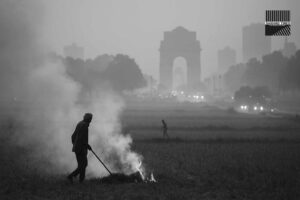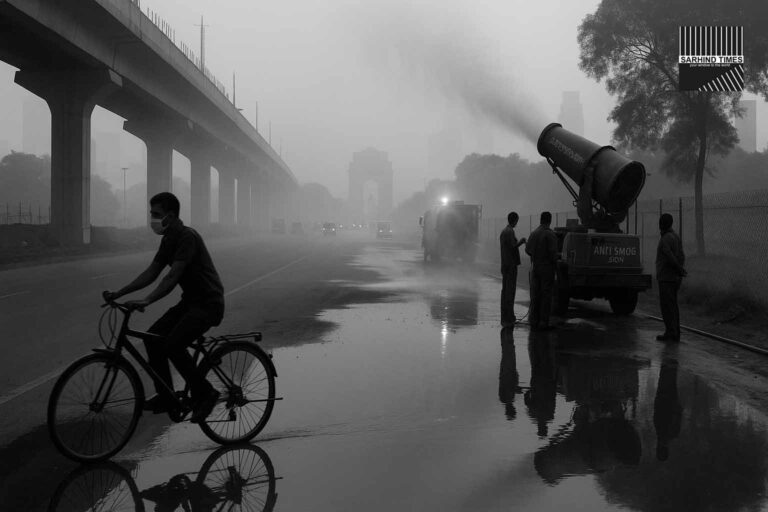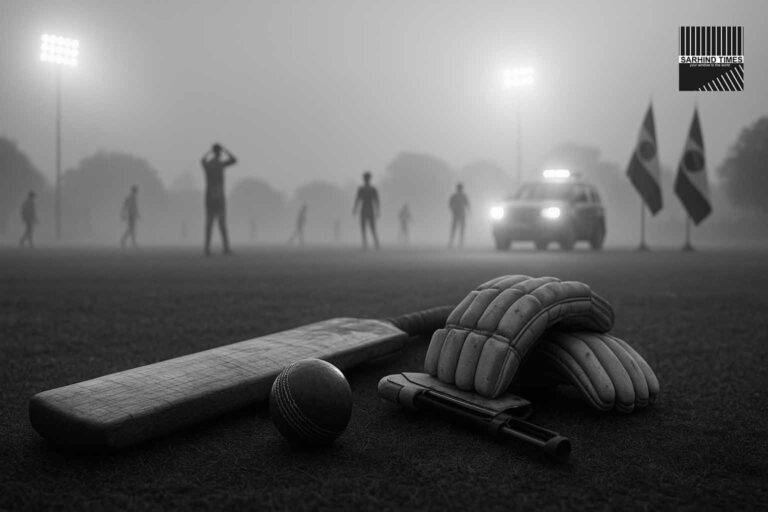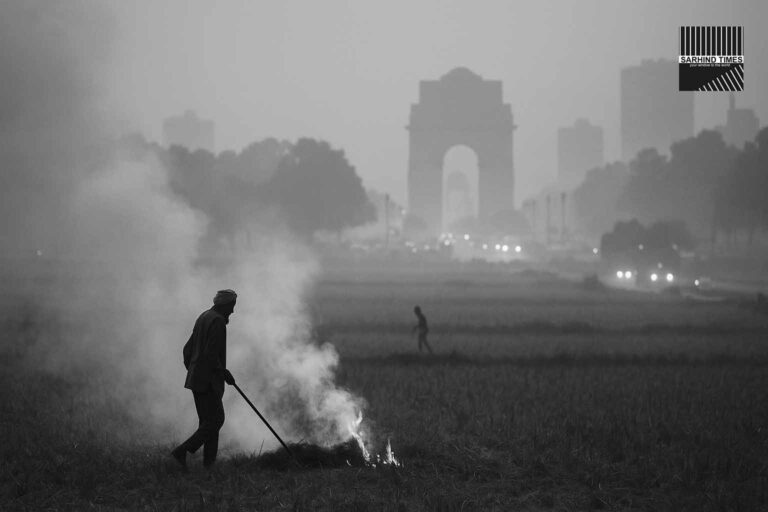By Sarhind Times Bureau | Rohtak | October 15, 2025
Introduction: A Force in Turmoil
In an incident that has sent shockwaves through the Haryana Police, an Assistant Sub-Inspector (ASI) posted in Rohtak has reportedly died by suicide, leaving behind a note that allegedly names a senior police officer in connection with corruption and misuse of authority.
The case, first reported by The Indian Express, has triggered an internal investigation and reignited public debate over corruption, harassment, and accountability within law enforcement ranks. As authorities scramble to verify the contents of the alleged note, the incident raises troubling questions about the psychological pressure and ethical rot affecting lower-tier personnel in state police forces.
The Incident: A Tragic End
According to officials, the ASI was found dead at his residence in Rohtak on Monday evening, with preliminary reports suggesting death by suicide. A purported handwritten note recovered from the scene accuses a senior officer of demanding bribes and creating a hostile work environment for subordinates.
Police sources said that the ASI had recently been involved in the arrest of a head constable reportedly close to the officer now under suspicion — a development that, according to colleagues, had strained professional relations within the station.
“He was a disciplined and diligent officer, but seemed under immense stress lately,” said a fellow officer, requesting anonymity. “There were rumours of internal friction after that arrest.”
The deceased officer’s body has been sent for post-mortem examination at PGIMS, Rohtak, while forensic experts have sealed the alleged suicide note for handwriting and chemical analysis.
The Note and Allegations
Police officials confirmed that the note explicitly names one senior officer and contains details that could point toward a pattern of monetary demands and coercive practices within the department.
The note’s authenticity will be determined after forensic verification, though investigators say the level of detail appears consistent with the officer’s handwriting.
“We are treating the note as primary evidence but will confirm its authenticity through forensic evaluation,” said Rohtak SP Himanshu Garg. “An impartial probe has been ordered and statements from family members, colleagues, and superiors are being recorded.”
The note reportedly alleges that promotions, transfers, and case assignments were routinely influenced by informal payments or “protection arrangements.”
If verified, these claims could form the basis for disciplinary as well as criminal proceedings under the Prevention of Corruption Act, 1988.
The Probe: Layers of Accountability
A three-member internal inquiry panel has been constituted under the supervision of a Deputy Superintendent of Police (DSP) from another district to ensure impartiality.
Sources indicate that the State Vigilance Bureau could also be roped in, depending on preliminary findings.
“The department takes such allegations seriously,” a senior Home Department official said. “If systemic lapses are proven, we will recommend a judicial inquiry.”
Meanwhile, the Rohtak Police Lines have been directed to assist the family and maintain confidentiality around sensitive material until verification is complete.
The Broader Pattern: Corruption and Pressure Within the Ranks
This is not the first time that corruption allegations have rocked the Haryana Police. Over the years, several cases have highlighted how lower-ranked officers often face coercive pressures from seniors over illicit fund collections linked to illegal transport, gambling, and excise activities.
A 2022 internal audit by the State Vigilance Bureau revealed that nearly 18% of complaints against police personnel were linked to bribery or extortion.
“The structural hierarchy of the police often traps junior officers between compliance and conscience,” said retired IPS officer Kiran Bedi, speaking on a similar issue last year. “They become the executors of a corrupt system they can’t reform.”
The Family’s Version: ‘He Tried to Speak Up’
Family members of the deceased ASI allege that he had repeatedly confided about workplace harassment and threats.
“He was upset for weeks,” said his brother-in-law. “He told us about pressure from seniors to act against his ethics. We told him to file a formal complaint, but he feared reprisal.”
Relatives have demanded a CBI or judicial probe, expressing doubt over an internal inquiry conducted by the same department implicated in the allegations.
His widow, visibly distraught, told reporters that her husband had once drafted a letter to higher authorities but never submitted it.
“He wanted to serve honestly,” she said. “But the system broke him.”
Civil Society and Political Response
The case has sparked widespread outrage among civil society groups and political observers.
Activists argue that this tragedy exposes the absence of effective whistle-blower protection in India’s policing framework.
The People’s Union for Civil Liberties (PUCL) and Transparency India have both demanded the formation of an independent oversight body to review systemic corruption within the Haryana Police.
“This incident is not an anomaly — it’s a symptom of institutional rot,” said Anjali Bhardwaj, co-convener of the National Campaign for People’s Right to Information (NCPRI). “Until there’s external accountability, suicides like these will keep repeating.”
Opposition leaders from the Congress and AAP called for the resignation or suspension of the officer named in the note pending investigation, accusing the government of “shielding a corrupt nexus.”
In response, the Home Department said it would “act strictly after factual verification.”
The Legal Dimension: Whistle-Blower and Custodial Safeguards
Legal experts emphasize the need for a time-bound, transparent investigation monitored by a judicial magistrate.
“This case should be treated as a whistle-blower complaint,” said Supreme Court advocate Meenakshi Arora. “If the note’s contents are substantiated, the accused officer should face proceedings under the Prevention of Corruption Act and Section 306 (abetment to suicide) of the Indian Penal Code.”
They further urged the Haryana government to activate the state-level whistle-blower protection mechanism, which remains largely dormant.
“Internal departmental inquiries lack the structural independence to ensure justice,” said Adv. Rajat Verma, a retired district judge. “Only a judicially monitored probe can inspire confidence.”
Mental Health in the Police Force: A Silent Crisis
Experts point out that police suicides in India have been rising, often linked to workplace harassment, stress, and lack of support systems.
According to National Crime Records Bureau (NCRB) data, 167 police personnel died by suicide in 2024 — a sharp increase over the previous year.
In Haryana alone, 11 suicides were recorded among police ranks, highlighting a mental health crisis aggravated by long hours, political interference, and lack of counselling mechanisms.
“The uniform hides vulnerability,” said Dr. Shalini Mehta, psychologist at PGIMS. “We expect emotional resilience without providing institutional care. That’s both unfair and dangerous.”
While some states like Kerala and Maharashtra have initiated ‘Police Wellness Programs’, Haryana is yet to establish a dedicated psychological support unit within its force.
Demand for Systemic Reforms
Public policy advocates say that the Rohtak incident should serve as a wake-up call to modernize police administration with transparency, internal checks, and independent grievance mechanisms.
Key reforms suggested include:
- Establishment of Police Complaints Authorities (as per Supreme Court’s 2006 Prakash Singh judgment).
- Mandatory asset declarations by all gazetted officers.
- Third-party audits of district-level funds and case handling.
- Regular mental health counselling sessions for staff.
- Strengthened state vigilance and Lokayukta powers.
“Corruption and burnout are twin crises feeding each other,” said retired DGP Ajit Doval (commenting at a recent forum). “We need structural solutions, not ceremonial committees.”
Public Sentiment: Distrust and Disquiet
Social media has been flooded with messages of condolence, anger, and demands for justice under hashtags like #JusticeForASI and #CleanTheSystem.
Citizens from Rohtak and neighbouring districts have begun small candle marches outside police stations, calling for the accused officer’s suspension.
“It’s heartbreaking that those who protect us can’t protect themselves from corruption,” wrote a user on X. “This case must not fade like so many others.”
Civil society groups are planning to petition the Haryana Human Rights Commission (HHRC) to intervene and ensure witness protection for officers willing to testify in the case.
Political Implications
The controversy comes at a politically sensitive time, with Haryana’s state elections approaching next year.
The government, already battling criticism over law and order, now faces fresh questions about institutional discipline and morale within the police.
“If the force loses faith in its leadership, public trust collapses next,” said Prof. Harish Chhabra, a political analyst. “This case could snowball into a major credibility issue for the state administration.”
Conclusion: The Thin Blue Line at Breaking Point
The death of the Rohtak ASI is more than a personal tragedy — it’s a mirror reflecting the deeper malaise of power, pressure, and silence within India’s policing apparatus.
As the probe unfolds, two urgent imperatives emerge: justice for the deceased and reform for the living.
Unless the inquiry is transparent, fair, and time-bound, the incident risks being absorbed into the long, tragic archive of ignored internal whistle-blowers.
For now, a grieving family waits, a department defends, and a state watches — torn between duty and denial.
#HaryanaPolice #Rohtak #Corruption #Accountability #LawAndOrder #PoliceReform #Justice #Whistleblower #Governance #SarhindTimes




















+ There are no comments
Add yours